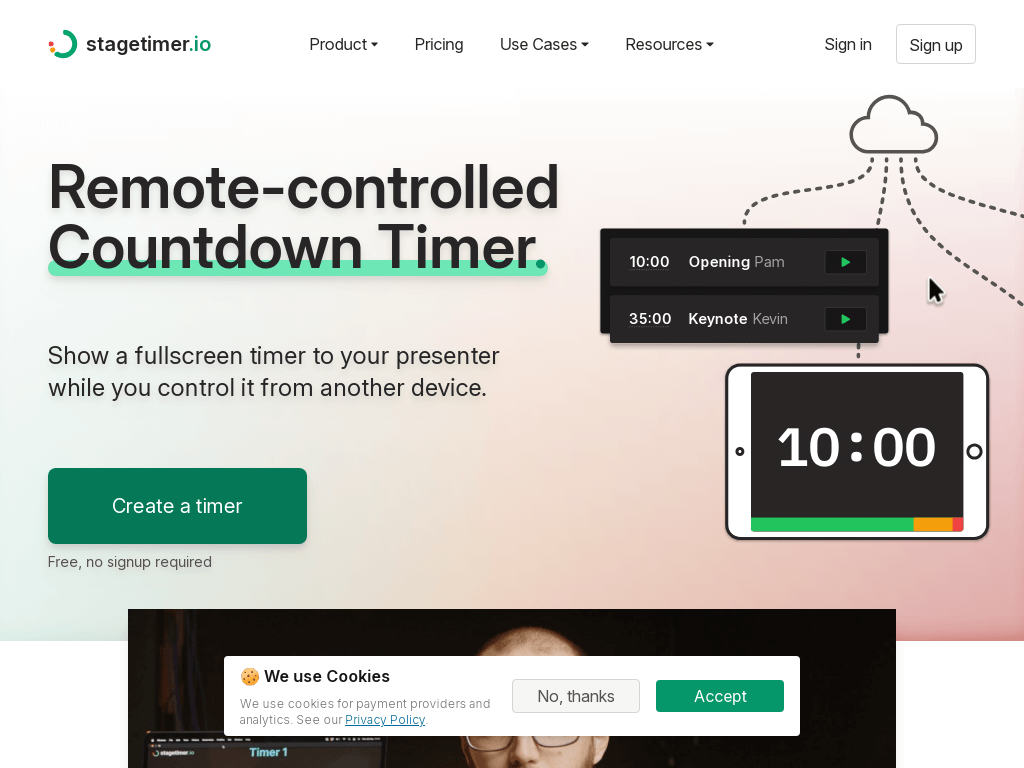Interview with the founder of StageTimer

What is StageTimer?
StageTimer is a web-based service that offers a remotely controlled countdown timer.
StageTimer is generating €9300 in monthly revenue through subscriptions. In this article, we have an interview with its founder, Lukas Hermann.
How did you come up with the idea for the business?
The idea for the business sprouted when I visited a friend who owned a studio. He had a cumbersome method of timing speakers, which involved using an old laptop with an outdated Flash app as a timer. After manually starting the timer, he would rush back to his video mixer to commence the recording. Witnessing this, I thought, "Surely there must be a more efficient solution out there." However, after looking into it, I found out there weren't any browser-based solutions, just a few native apps.
Seeing such a simple problem that didn't have a viable solution inspired me to create the first version of Stagetimer over a single weekend.
The idea has evolved significantly since then, largely thanks to our customers, mainly video and event production companies. As industry outsiders, we've had to learn a great deal from our clients about how they use our tool, how they would like to use it, and what factors are deal-breakers for them. Their invaluable input has helped us refine and improve our product.
How did you build the product?
I initially built the Minimum Viable Product (MVP) in just one weekend. The MVP was simple, with no user accounts, pricing, or even a dashboard. I used the technology I was familiar with, primarily JavaScript (Vue, Node.js, Express).
Once the MVP was in place, I shared it on Reddit, hoping to get some constructive feedback. Initially, finding the right subreddit was a challenge since I was an outsider to the industry. However, when I did find a suitable one, I found the community incredibly supportive, offering valuable suggestions. From these suggestions, I built a backlog of tasks and steadily worked through them.
Despite the MVP being ready within a weekend, it took 224 days before I earned my first dollar from it. During this time, I was still working my regular job, so all the development work for Stagetimer was done during my free time and weekends.
How big was your team when you started?
When I started, it was just me working on the project. It began as a personal experiment to understand what it feels like to build a product and put it on the market.
How did you launch the business?
I launched the business initially as a free app. Its initial success and widespread use in its free version gave me the confidence to release a paid version of the tool in June 2021. I announced the launch of the paid version via a simple post on Reddit to gauge the response.
How have you grown the business since its launch?
The primary drivers of growth for the business have been Google and word of mouth. About 50% of our users find us through Google Ads or organic search. Another 40% come to us through recommendations from other users.
What is the business model (ads/subscription etc)?
We operate on a freemium model. This means that Stagetimer can be used for free with a limited set of features. To access more features, users have to opt for a subscription, which comes in two tiers. However, unlike other SaaS offerings, we also provide one-time packages with a license valid for 10 days. Many of our clients opt for these several times a year. This model works well for them as they can directly forward the cost to their customers without having to split monthly subscriptions.
What do your financials look like?
As of now, our Monthly Recurring Revenue (MRR) is at €9300. However, our monthly revenue is slightly higher due to event licenses, which are 10-day access passes we sell without recurring payments.
Our business has a seasonal aspect as well. We tend to earn more than double in September and October compared to June and July.
Profit margins generally hover around 80% of our revenue as we've automated a lot of our processes. However, we have recently employed the help of some contractors, which has lowered the margin slightly.
